CUSSH
As a Research Fellow at UCL, I was actively involved in the CUSSH (Complex Urban Systems for Sustainability and Health) project. CUSSH was an international multi-year effort aiming at helping cities around the world to achieve population health and environmental sustainability. My role within CUSSH included the development and application of models to assess the impact on environmental parameters and support policy decision-making.
More information about the project can be found at: CUSSH
DISSERTATION: HEAT WAVES IN SENIOR PUBLIC HOUSING SITES
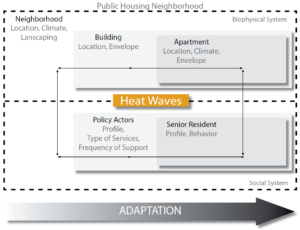
Heat waves are among the deadliest natural disasters and their impacts on urban areas and populations are more evident in sites of lower socio-economic status and poor indoor/outdoor living conditions. In my dissertation, I examined the thermal and air quality conditions in senior public housing sites during heat waves. My approach investigated the joint effect of site amenities, building characteristics and occupant actions on thermal comfort and indoor air quality through a social-ecological systems framework, to identify cost-effective strategies that can assist low-income seniors in coping with heat.
This research was funded by NSF grant AGS-1645786.
INDOOR-OUTDOOR INTERVENTIONS TO IMPROVE INDOOR AIR QUALITY
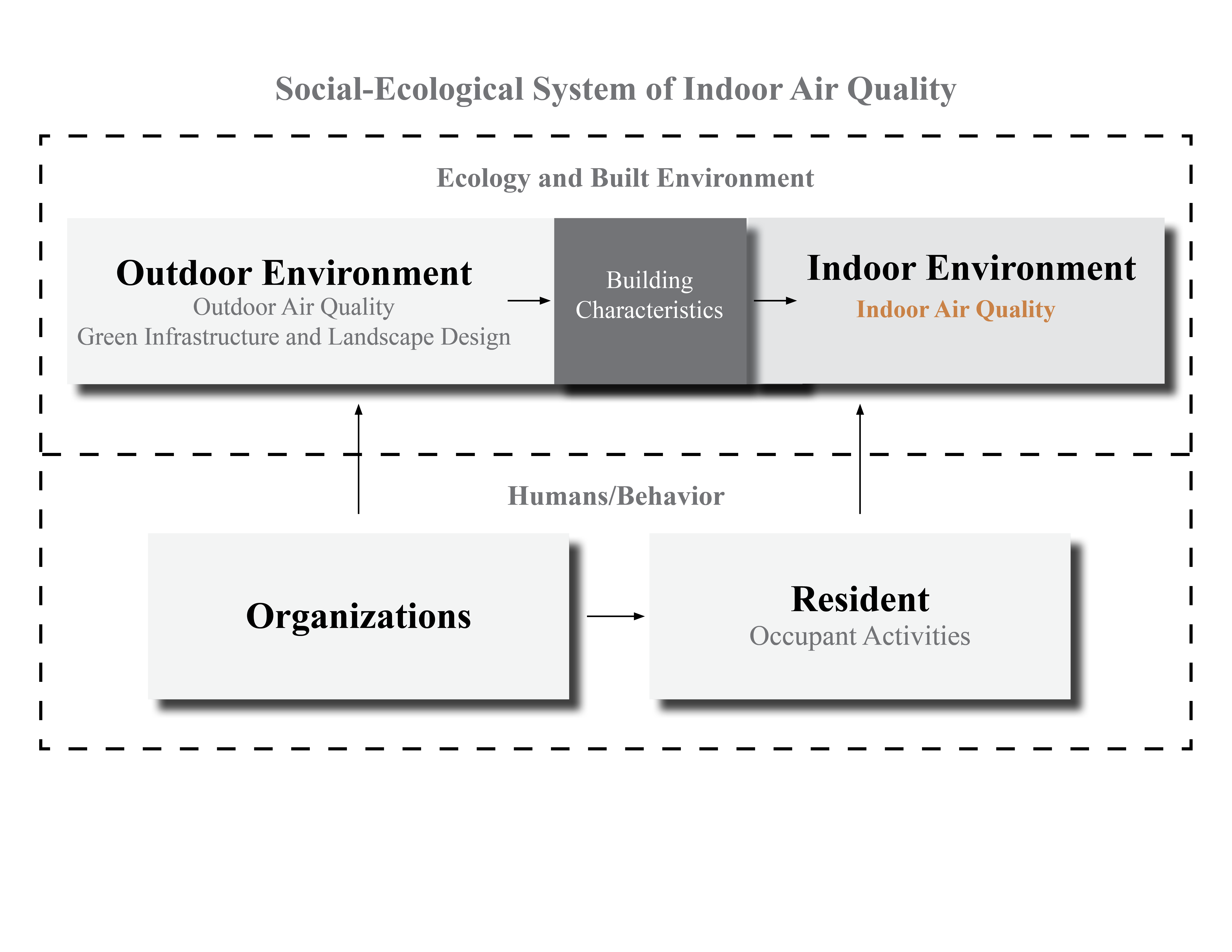
Given that people spend most of their time indoors, indoor air quality (IAQ) is important for their health and well-being. In this work, we collected evidence on the environmental, physical and behavioral factors affecting selected indoor pollutants. We found that since these factors vary by location and socio-economic status, collaboration between residents and local organizations is vital in the case of low-resource communities. Guided by a social-ecological systems framework, we eventually offered a list of cost-effective interventions across the indoor-outdoor continuum.
This research was funded by Rutgers University CDHW-IRG.
GREEN AND RESILIENT STRATEGIES FOR SHELTER-SAFE BUILDINGS
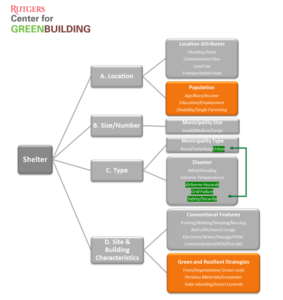 Some types of natural and human-caused hazards require emergency shelters provided by local governments. Current public shelter characteristics, as found in federal, state, local websites and documents, need updates to increase the resiliency of communities during hazards. In our work, we argue that resiliency can be increased by incorporating green building strategies into different types of shelter-safe buildings. In addition, we place emphasis on the concept of vulnerability and we find that to minimize risks and losses during hazards, the locations and configurations of public shelter-safe buildings should be optimized to serve the most vulnerable population groups. We lastly offer a list of suggested simple updates that can benefit communities and minimize risks during disasters.
Some types of natural and human-caused hazards require emergency shelters provided by local governments. Current public shelter characteristics, as found in federal, state, local websites and documents, need updates to increase the resiliency of communities during hazards. In our work, we argue that resiliency can be increased by incorporating green building strategies into different types of shelter-safe buildings. In addition, we place emphasis on the concept of vulnerability and we find that to minimize risks and losses during hazards, the locations and configurations of public shelter-safe buildings should be optimized to serve the most vulnerable population groups. We lastly offer a list of suggested simple updates that can benefit communities and minimize risks during disasters.
This research was funded by NJ Department of Community Affairs.
SYNTHETIC DATA FOR OB MODELING DURING BUILDING DESIGN
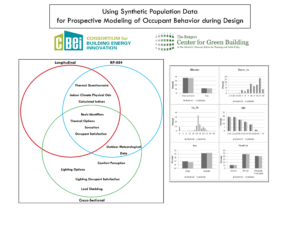 Common practice in building modeling often ignores the effect of occupant behaviors and actions on energy, air quality and other performance aspects, although widely shown in research. This may relate to limited data availability, which can be overcome by generating synthetic groups of occupants that can be used by building modelers.
Common practice in building modeling often ignores the effect of occupant behaviors and actions on energy, air quality and other performance aspects, although widely shown in research. This may relate to limited data availability, which can be overcome by generating synthetic groups of occupants that can be used by building modelers.
This research was funded by the CBEI sponsored by the U.S.DOE under Award Number DE-EE0004261.
A LIVING LABORATORY TO TEST HUMAN-ENVIRONMENT INTERACTIONS
“Living laboratories” test real-time, human-environment interactions and provide continuous feedback to researchers interested in creating more sustainable and productive workplaces. Here, we answer to what extent different types of workplace designs satisfy diverse occupant preferences and needs, how do users react to unsuccessful workplace designs, and what designs/policies promote innovation. Our analysis identifies behavioral-environmental patterns to assist in workplace designs/policies. The physical settings include both interior and exterior spaces.
COASTAL RESILIENCY
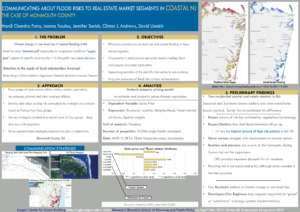 Climate change is raising sea levels, thereby increasing the chances for flooding hazards. Real estate markets in coastal areas are driven by great uncertainty in terms of property acquisition, use and rehabilitation. This work characterizes in detail private and public decision making about real property in coastal communities, brings new awareness of flood risks to stakeholders involved and considers green and resilient strategies.
Climate change is raising sea levels, thereby increasing the chances for flooding hazards. Real estate markets in coastal areas are driven by great uncertainty in terms of property acquisition, use and rehabilitation. This work characterizes in detail private and public decision making about real property in coastal communities, brings new awareness of flood risks to stakeholders involved and considers green and resilient strategies.
This research was funded by NJ Sea Grant project 6410-0012.
URBAN WATER SYSTEMS
How can urban areas function effectively without sound water supply, sewer and stormwater systems? This work reviews urban water infrastructure in NJ municipalities that have “old”/combined sewer systems and discharge through Combined Sewer Overflows (CSOs) in part or all of their area. It further examines issues regarding water supply capacity and wastewater capacity for these municipalities.
This research was funded by NJ Future.
